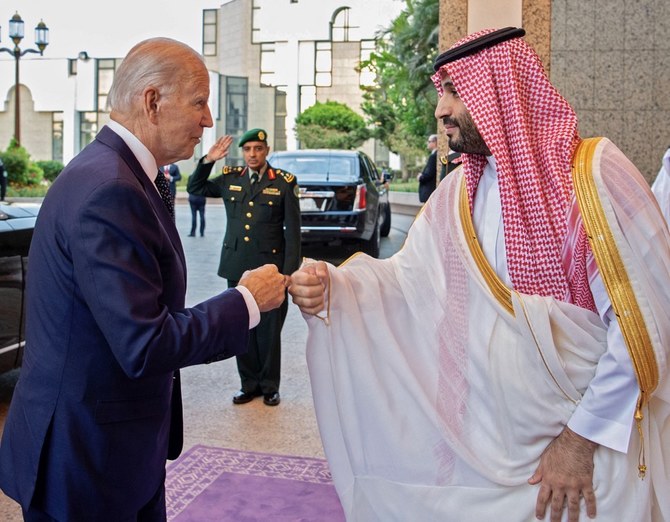
In an interview with Arab News last Sunday, American financier and former White House official Anthony Scaramucci described the 78-year-old US-Saudi relationship as a “Catholic marriage.” Urging leaders in both countries to think long term, he said: “Our economies, our governments, our intelligence communities, our defense departments are very much intertwined.”
Scaramucci was speaking in Abu Dhabi, which was hosting SALT — his thought-leadership summit — for the second time. He revealed plans to bring a version of SALT to Saudi Arabia, which he applauded for its ongoing reforms with its best years ahead of it.
Not far from the UAE capital, another thought-leadership forum was taking place in the historic Saudi city of AlUla. Its focus was a candid discussion of the status of Saudi-US relations. It was sponsored by THINK — an affiliate of SRMG, which publishes this newspaper — at the Maraya hall, where the AlUla Declaration was signed two years ago.
As with the US-Saudi relationship, the AlUla signatories (Saudi Arabia, the UAE, Bahrain, Egypt and Qatar) demonstrated that they share unbreakable bonds. The declaration ended a 43-month boycott and one of the most dramatic periods in recent Gulf history.
Now, had I not known that our interview with Scaramucci was recorded before the AlUla forum, I would have said he was either psychic or had been eavesdropping on its discussions. The marriage metaphor was so repeatedly — and humorously — used that the forum began to sound like a couples therapy session (that those attending were sitting in a large circle might have contributed to that).
Scaramucci has hit the nail on the head: the US-Saudi relationship is indeed like a Catholic marriage. Anyone who argues otherwise is either misinformed or delusional.
Readers may need reminding that, whatever the armchair Middle East experts in DC say, even at the lowest points of Saudi ties with the current US administration, President Joe Biden’s team was determined not to “rupture the relationship.”
After all, who in their right mind would want to damage relations with the Custodian of the Two Holy Mosques and thereby upset 2 billion Muslims? And who in their right mind would risk disrupting energy markets in a dispute with the world’s leading oil exporter? Equally, Saudi officials have repeatedly said that ties to Washington remain ironclad and the US is a priority.
So what went wrong? That would require a series of columns to answer in full. But in summary, there has been mistrust on the Saudi side, and miscalculation on the US side.
The Saudi mistrust is well placed; this is an administration hostile to our leadership from the get-go. It placed Saudi civilian lives at risk when it revoked the designation of the Houthis as terrorists, and withdrew Patriot missile batteries from the Kingdom when the Iran-backed militia were deliberately targeting Saudi cities.
The US miscalculation took many forms. The Biden administration underestimated the popularity of Crown Prince Mohammad bin Salman, hailed by a vast majority of Saudis as a liberator. It also was slow in understanding that it is dealing with a new, progressive and different Saudi leadership. The Saudi view is simple: Treat us as true partners, not lackeys.
It also is evident that Washington has miscalculated its own interests with its constant characterization of Riyadh’s relationships with China and Russia as a betrayal.
American retailers in the early 20th century created the concept that “the customer is always right.” How, then, does the US think Saudi Arabia should deal with China, its biggest oil customer, purchaser of 1.75 million barrels per day in 2022? China is also a leading global economy and manufacturing hub that is happy to sell its premium and much-needed products without any drama. If the US cannot offer an alternative, what should the Kingdom do? Not upgrade its communications networks, or risk the lives of its citizens?
Indeed America itself is so reliant on China that not doing business with it hurts its own interests. China holds $867 billion in US debt, second only to Japan. It is also tops the list of US trading partners, with American exports to China supporting a million jobs in 2021.
As for Russia, Riyadh’s relationship with Moscow is the subject of constant US misrepresentation. The Kingdom condemned the Russian invasion at the UN last year; Ukrainian President Volodomyr Zelensky thanked Saudi Arabia for its support; November’s OPEC+ production cut led to reduced oil prices, the US aim all along — but despite all that, Washington labeled the Kingdom pro-Russian! The US ignores the benefits of the trust Riyadh has built with Moscow over the years, which materialized in last year’s prisoner swap with Ukraine and the release of US citizens. It is now emerging that this same trust might, just might, result in a serious discussion to end the war — a war for which, apart from the ghastly loss of life, the world and the US economy are paying a hefty price.
The bottom line? As the AlUla declaration demonstrated, mutual benefits are all that matters; and there are many from which both Riyadh and Washington can benefit, beyond the outdated “oil for security” trope which is no longer valid. As Winston Churchill put it: “We have no lasting friends, no lasting enemies, only lasting interests.” Or if the US would prefer something more American, as Tina Turner sang: “What’s love got to do with it?”
• Faisal J. Abbas is the editor in chief of Arab News
Twitter: @FaisalJAbbas












